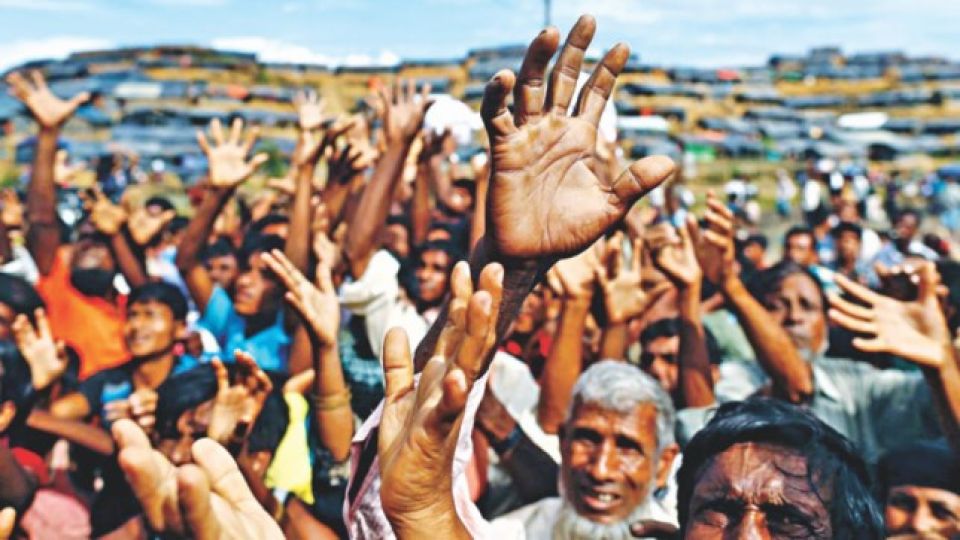February 5, 2020
This announcement by the ICC comes at a time when the International Court of Justice (ICJ) has issued a preliminary ruling against Myanmar, imposing four provisional measures against the state.
The International Criminal Court (ICC) Tuesday officially launched an investigation into the allegations of atrocities committed by Myanmar against the Rohingyas.
The intergovernmental organisation and international tribunal that sits in The Hague also announced that they will be investigating the crimes of deportation, which also includes crimes against humanity.
Phakiso Mochochoko, director of the Jurisdiction, Complementary and Cooperation division of the ICC Office of the Prosecutor, made the announcement at a press conference at Pan Pacific Sonargaon hotel in the capital yesterday afternoon.
“Whoever you are, whatever position you hold, you will be held individually criminally responsible,” Mochochoko said, adding that the process will identify individual perpetrators, including soldiers.
This announcement by the ICC comes at a time when the International Court of Justice (ICJ) has issued a preliminary ruling against Myanmar, imposing four provisional measures against the state.
The measures require the government to prevent genocidal acts, ensure that military and police forces do not commit genocide, preserve evidence of genocidal acts, and report back on its compliance within four months, and then every six months afterwards.
This legal proceeding is different from the ICJ because, while the ICJ prosecutes states and orders governments to take certain actions, the ICC prosecutes individuals and sentences them to prison.
The Office of the Prosecutor at the ICC will now carefully and thoroughly seek to uncover the truth about what happened to the Rohingyas in Myanmar which brought them here to Bangladesh, a press release handed out at the conference said.
The ICC has jurisdiction to prosecute individuals for international crimes of genocide, crimes against humanity, war crimes, and the crime of aggression. “This is the first time we are investigation the crime of deportation,” commented Mochochoko.
Myanmar, however, is not yet cooperating with the ICC, said the official. “Myanmar is not talking with us, nor allowing us into the country,” Mochochoko said.
The reason behind this is that Myanmar is not a state party to the Rome Statute, the 1998 treaty that established the International Criminal Court as an intergovernmental body with the jurisdiction to arbiter the gravest of crimes. There is no obligation on their part to cooperate.
Mochochoko however commented that this is not an insurmountable challenge, and regardless of whether Myanmar allows them into the country, they will be able to identify perpetrators. “Our investigators are trained to find evidence and the evidence will lead [us] to the perpetrators,” he said.
However, he also added that Myanmar’s non-cooperation will impact the time needed to complete the investigation.
“The process will take as long as is necessary. It may take a year, two years, but in the end, justice will be done.”
There is currently a team of investigators from ICC in the Rohingya camps, who will be looking into crimes committed against the Rohingyas since 2016.
The ICC cannot hand out death penalties, but can sentence individuals to different lengths of prison terms. It, however, is dependent on respective states on arrest and can imprison individuals upon conviction, meaning, the court has to rely on Myanmar to arrest its own perpetrators.
“Should a conviction come, it will be a challenge for us to arrest anyone from Myanmar,” remarked the official, adding that it is not going to be an insurmountable challenge.
“We currently have 15 outstanding arrest warrants,” he said. This includes Joseph Kony, commander-in-chief of the Lord’s Resistance Army in Uganda, and Saif al-Islam Gaddafi, the son of Libyan icon Colonel Muammar Gaddafi, and the “de facto” prime minister of Libya.
Till date, the court has indicted 44 people and investigated into crimes committed in the Democratic Republic of the Congo, Uganda, the Central African Republic, Sudan, Kenya, Libya, Côte d’Ivoire, Mali, Georgia and Burundi.


